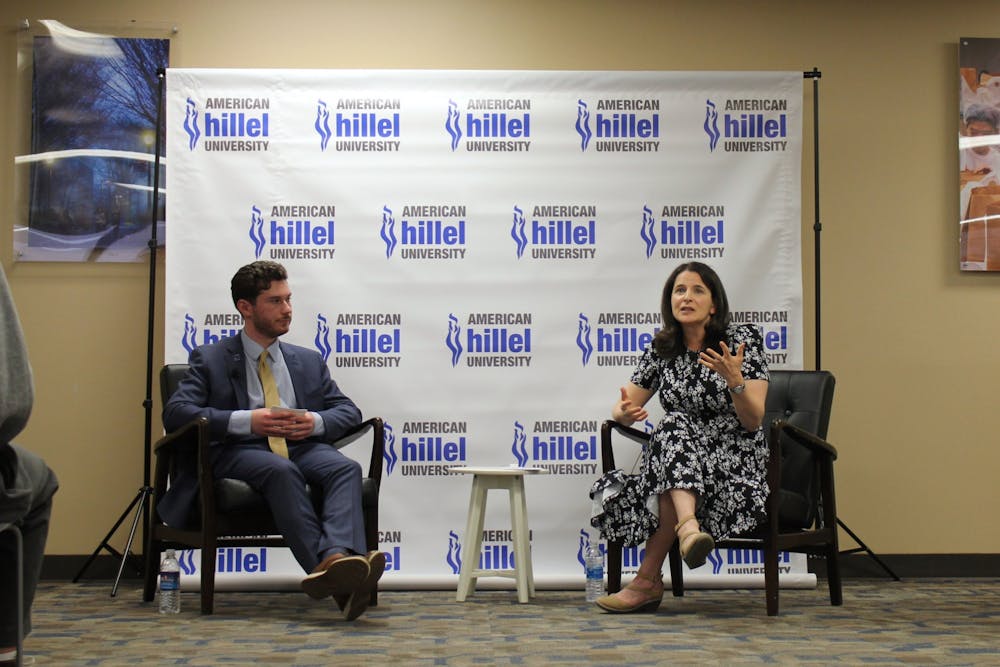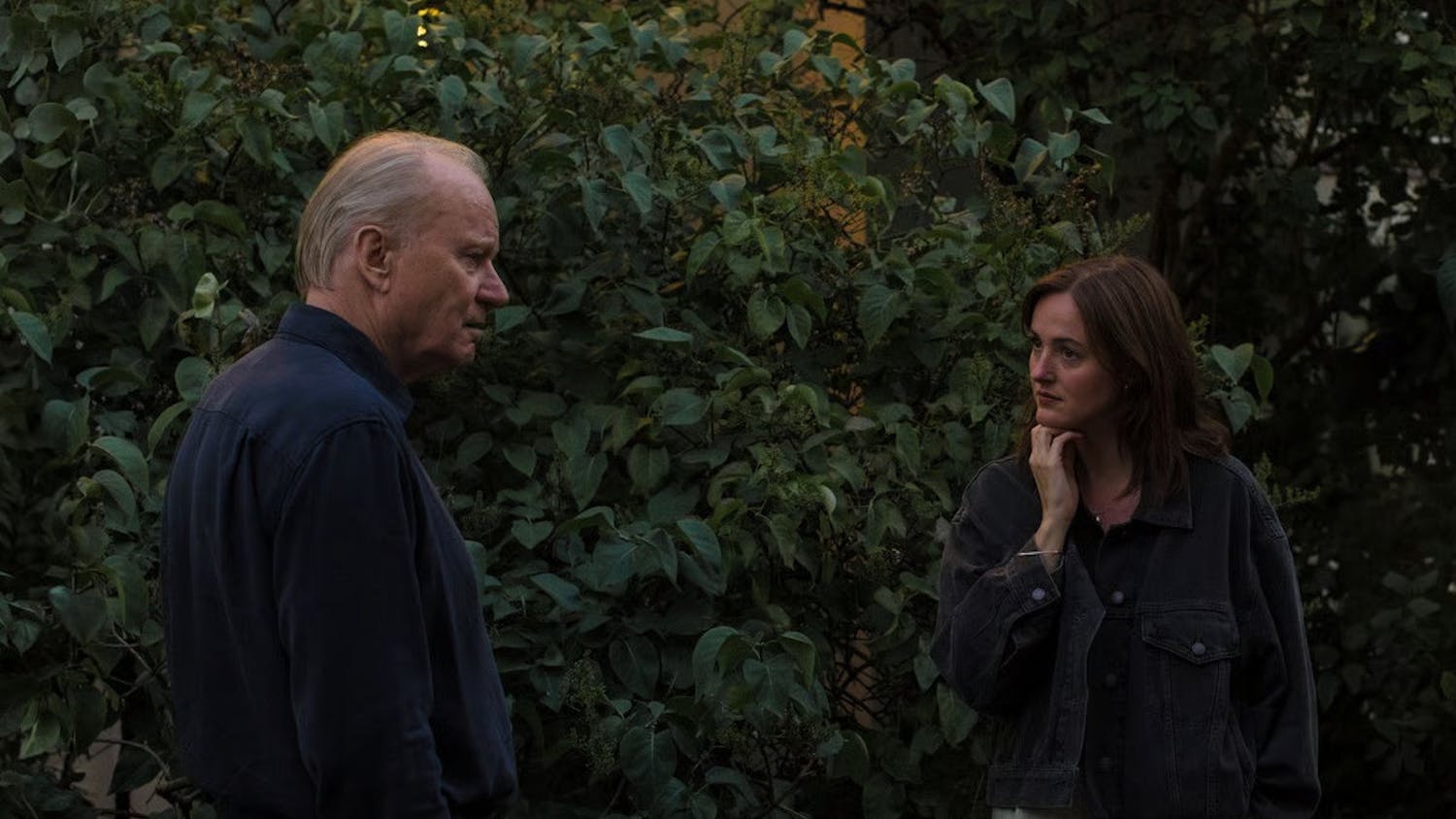American University’s Hillel chapter and the Kennedy Political Union welcomed author and speechwriter Sarah Hurwitz for a conversation to begin Hillel’s Holocaust Remembrance Week on April 8.
Hurwitz spoke to students about her experience working in the White House while navigating her religious journey. As a Jewish American, she spoke to students about how to deal with religious uncertainty and stay true to one’s core values.
“Thank you for being in conversation with me,” Hurwitz said at the start of the discussion. “So far I have gotten to meet with students who are really inspiring and give me a lot of hope, so thank you.”
Hurwitz is a graduate of Harvard Law School but said she found her interests leaning more toward speechwriting than becoming a lawyer. She worked on campaigns for Gen. Wesley Clark, John Kerry and Hillary Clinton before becoming the senior speechwriter for former President Barack Obama in 2009. Although she enjoyed this position, Hurwitz said she preferred writing for the first lady, and in 2010, she became the head speechwriter for former first lady Michelle Obama.
Growing up in what she described as a “culturally Jewish” household, Hurwitz said she approached her faith “half-heartedly.” She attended Hebrew school and was part of a Jewish community, but said her parents were never religious people. She said that it wasn’t until after a breakup and bouts of severe anxiety that she turned to Judaism for guidance in her 30s.
“I happened to hear about an intro to Judaism class being offered at the D.C. Jewish community center,” Hurwitz said to the crowd. “What blew me away was studying the text in class. Texts about Jewish ethics, about life cycle rituals and holidays and spirituality. I thought, ‘Where has this been all my life?’”
She added that she wanted to read more about Judaism soon after, but struggled to find the right book. This, she said, led her to publish her first book, “Here All Along: Finding Meaning, Spirituality, and a Deeper Connection in Life — Through Judaism.”
“Where is [a book on Judaism] that covers the basics and immerses the most radical, transformational and inspiring lessons, but translated into English?” Hurwitz said. “After a while, I just decided that maybe I could actually write the book that I needed.”
Marking the beginning of Holocaust Remembrance Week, Hurwitz said she hopes everyone can honor the millions of lives lost during the Holocaust. She also stressed the importance of recognizing Jewish culture outside of tragedy.
“It is important to celebrate how Jews lived, not just how they died,” Hurwitz said. “American law tells us, ‘Do whatever you want as long as you don’t steal people’s property,’ right? There's nothing there about compassion, generosity, maturity, self-sacrifice or self-restraint, and studying Jewish law, I discovered this.”
With the ongoing Israel-Hamas war, Hurwitz said she thinks a “hostile environment” has formed on college campuses due to rising antisemitism.
“I’m just seeing students become very ostracized,” Hurwitz said. “It's almost like, if you go to Hillel, then you’re a problem, and it’s making students feel very uncomfortable. It’s important for us to find a community, whether it’s a Jewish community or some other community.”
Hurwitz said antisemitism takes many forms other than physical retaliation, and she advises all students to think carefully about what they choose to say to others.
“Don’t be careless about your language,” Hurwitz said. “Rabbi Mark Zimmerman wrote ‘The American Rabbi,’ and he made the point that the Holocaust was not started with gas chambers; it started with propaganda, slander and dehumanizing words. Words have meaning.”
She added that college campuses have become more exclusive, and she condemns student organizations that are keeping Jewish students out because of their religion. Hurwitz said she feels Jewish students today have to “reject” a connection to Israel to fit in with their peers.
“Today there is demand that if you reject Israel, then you are acceptable, and what becomes very complicated is the word ‘Zionist’ means so many different things to so many different people,” Hurwitz said. “And the fact that they're not allowed to touch that, that they're demanded to just totally disassociate themselves from their ancestral homeland that has been central to their religion, is a real problem.”
Hurwitz said she is saddened to see how Jewish students are “being humiliated and abused” on college campuses because of current events in Israel and Gaza. Political stances aside, she said, she hopes everyone can recognize that no student deserves to be harmed.
“Can we just agree that it’s wrong? Can we just agree that it’s unkind? Jewish students feel unwelcome, and I don’t wish that on any student,” Hurwitz said. “I hope we can agree it’s not okay.”
Hurwitz concluded by saying that she is hopeful about how Jewish students have handled current circumstances and reminded them to stay true to the values of Judaism.
“You're going to have to balance honesty, kindness, justice and mercy,” Hurwitz said. “There are always going to be people who value you, and try to honor them, and I can say with confidence that I see this. I'm proud of all of you.”
This article was edited by Kathryn Squyres, Zoe Bell, Tyler Davis and Abigail Turner. Copy editing done by Luna Jinks, Isabelle Kravis and Ariana Kavoossi.





